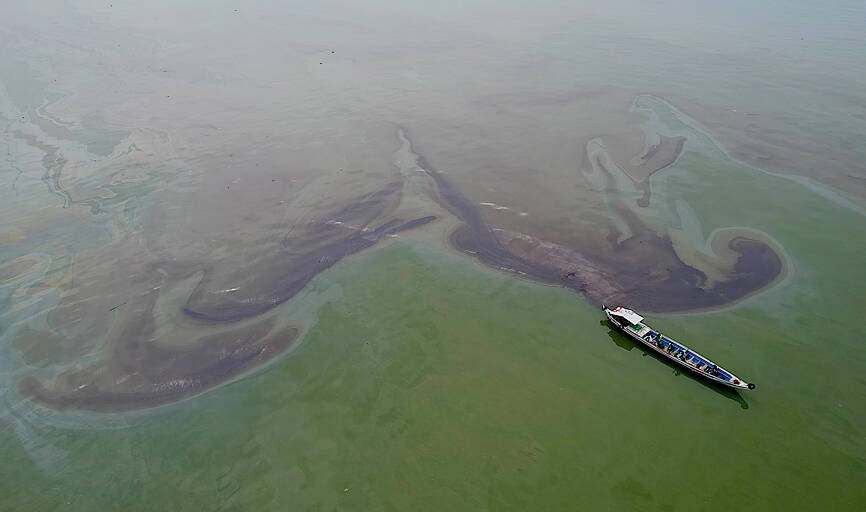The Philippines yesterday postponed the removal of fuel from a tanker that sank in Manila Bay, with fears of an environmental catastrophe growing as leaking oil reached shore for the first time.
The siphoning of the 1.4 million liters of industrial fuel oil from the vessel’s hold was pushed back to tomorrow at the earliest so divers could seal nine leaking valves first, Philippine Coast Guard spokesman Rear Admiral Armando Balilo told reporters.
The MT Terra Nova in bad weather off Manila early on Thursday, killing one crew member and leaving the country facing the possibility of its worst oil spill ever.

Photo: EPA-EFE
“An order was given to seal the valves first before the start of the siphoning operations in order to prevent further leakages,” Balilo said yesterday. “The weather remains bad out there, but they have a target to finish this [sealing the valves] by tomorrow.”
The leaking oil had now reached a patch of shoreline in Hagonoy municipality of the Bulacan province, about 40km northwest of Manila, he said.
Coast guard cleanup teams were yesterday dispatched to the area to spray oil dispersants, he said.
Balilo had no estimates as to how much beach was affected or what kind of damage the oil had done.
The coast guard has warned that if the entire cargo were to leak, it would be an “environmental catastrophe.”
It has also called for a suspension of fishing in Manila Bay to prevent people “eating contaminated fish.”
Meanwhile, another coast guard team was on Saturday dispatched to the mouth of Manila Bay to join the search for an unspecified number of crew members who were aboard a second tanker that sank nearby, Balilo said.
The wreck of the MTKR Jason Bradley has been located and a salvage would follow, a coast guard statement said, adding it had no cargo on board.
The sinkings occurred as heavy rains fueled by Typhoon Gaemi and the seasonal monsoon lashed Manila and surrounding regions.

Kehinde Sanni spends his days smoothing out dents and repainting scratched bumpers in a modest autobody shop in Lagos. He has never left Nigeria, yet he speaks glowingly of Burkina Faso military leader Ibrahim Traore. “Nigeria needs someone like Ibrahim Traore of Burkina Faso. He is doing well for his country,” Sanni said. His admiration is shaped by a steady stream of viral videos, memes and social media posts — many misleading or outright false — portraying Traore as a fearless reformer who defied Western powers and reclaimed his country’s dignity. The Burkinabe strongman swept into power following a coup in September 2022

‘FRAGMENTING’: British politics have for a long time been dominated by the Labor Party and the Tories, but polls suggest that Reform now poses a significant challenge Hard-right upstarts Reform UK snatched a parliamentary seat from British Prime Minister Keir Starmer’s Labor Party yesterday in local elections that dealt a blow to the UK’s two establishment parties. Reform, led by anti-immigrant firebrand Nigel Farage, won the by-election in Runcorn and Helsby in northwest England by just six votes, as it picked up gains in other localities, including one mayoralty. The group’s strong showing continues momentum it built up at last year’s general election and appears to confirm a trend that the UK is entering an era of multi-party politics. “For the movement, for the party it’s a very, very big

ENTERTAINMENT: Rio officials have a history of organizing massive concerts on Copacabana Beach, with Madonna’s show drawing about 1.6 million fans last year Lady Gaga on Saturday night gave a free concert in front of 2 million fans who poured onto Copacabana Beach in Rio de Janeiro for the biggest show of her career. “Tonight, we’re making history... Thank you for making history with me,” Lady Gaga told a screaming crowd. The Mother Monster, as she is known, started the show at about 10:10pm local time with her 2011 song Bloody Mary. Cries of joy rose from the tightly packed fans who sang and danced shoulder-to-shoulder on the vast stretch of sand. Concert organizers said 2.1 million people attended the show. Lady Gaga

SUPPORT: The Australian prime minister promised to back Kyiv against Russia’s invasion, saying: ‘That’s my government’s position. It was yesterday. It still is’ Left-leaning Australian Prime Minister Anthony Albanese yesterday basked in his landslide election win, promising a “disciplined, orderly” government to confront cost-of-living pain and tariff turmoil. People clapped as the 62-year-old and his fiancee, Jodie Haydon, who visited his old inner Sydney haunt, Cafe Italia, surrounded by a crowd of jostling photographers and journalists. Albanese’s Labor Party is on course to win at least 83 seats in the 150-member parliament, partial results showed. Opposition leader Peter Dutton’s conservative Liberal-National coalition had just 38 seats, and other parties 12. Another 17 seats were still in doubt. “We will be a disciplined, orderly